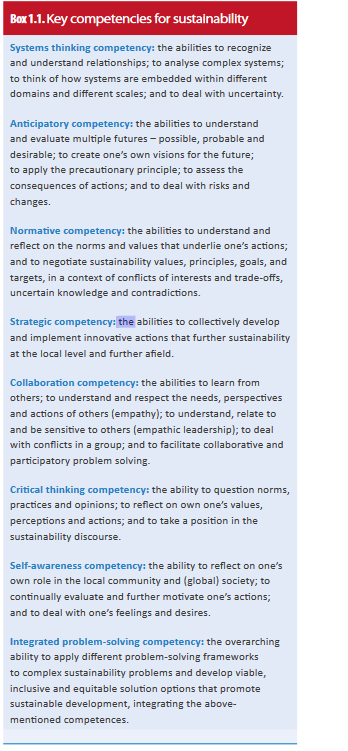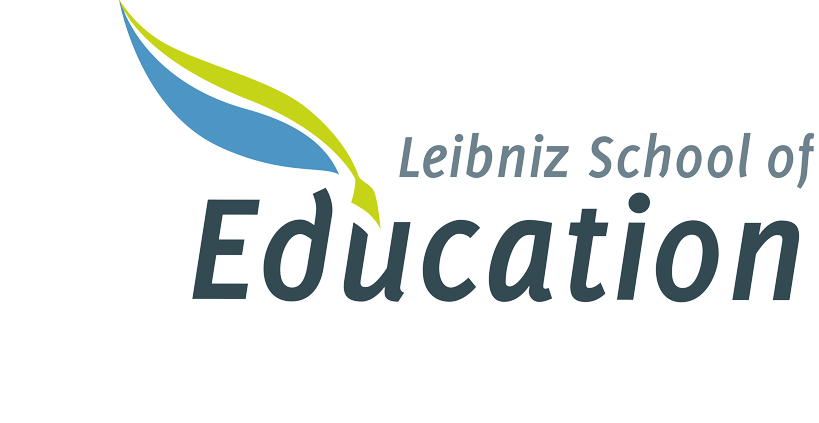What and how do people need to know, be able to do and be in order to actively participate in the eco-social transformation of society?
As in almost all (formal) areas of education, the description of learning objectives in the form of competencies that learners are supposed to develop has also gained acceptance in the field of ESD.
In its publication "Education for Sustainable Development Goals - Learning Objectives", UNESCO defines overarching (see box below) and SDG-specific learning objectives and competencies.
In the German-speaking world, reference is made primarily to two competency models: the model of Gestaltungskompetenz - "12 Competencies of ESD" according to Gerald de Haan (2008) and the core competencies in the Orientation Framework for Global Development Education (new edition 2016) of the KMK (see box below).


 ©
UNESCO (2017): Education for Sutanable Development Goals -Learning Objectives. S. 6.
©
UNESCO (2017): Education for Sutanable Development Goals -Learning Objectives. S. 6.
![[Translate to English:] Tabelle mit BNE Kompetenzen des Orientierungsrahmens](https://www.lse.uni-hannover.de/fileadmin/_processed_/c/f/csm_OR_Kompetenzmodell_6d176f2b90.png)
![[Translate to English:] Tabelle mit BNE Kompetenzen des Orientierungsrahmens](https://www.lse.uni-hannover.de/fileadmin/lehrerbildung/Fotos/Teaching_Change/OR_Kompetenzmodell.png)
![[Translate to English:] Tabelle mit BNE Kompetenzen des Orientierungsrahmens](https://www.lse.uni-hannover.de/fileadmin/lehrerbildung/Fotos/Teaching_Change/OR_Kompetenzmodell.png) ©
KMK Orientierungsrahmen Globale Entwicklung, S.95.
©
KMK Orientierungsrahmen Globale Entwicklung, S.95.
In their publication "Learning for the Future - Competencies in Education for Sustainable Development", the United Nations define the competencies that teachers and lecturers should develop in order to be able to implement ESD as multipliers along the four learning areas "learning to acquire knowledge", "learning to live together", "learning to act" and "learning to be". Here it becomes clear what a great role the development of a pedagogical attitude plays in interaction with a global social awareness: ESD teaching competence is based more on a lived attitude than (only) on specialized knowledge and methodical-didactical skills.
Based on this competence concept for teachers and lectures, the Erasmus+ project "A Rounder Sense of Purpose - educator competences for Education for Sustainable Development", with the participation of Prof. Marco Rieckmann, University of Vechta, has developed and tested a range of guidelines and tools for multiplier training - under the guiding question: What kind of teachers are needed to support learners to take on global challenges and prepare for their impacts?
In the spirit of integrally linking outer and inner change, the Inner Development Goals created an inner map of transformative skills that individuals would need to learn in order to contribute to the achievement of the SDGs - along the learning dimensions of Being, Thinking, Relating, Collaborating, and Acting.
A narrow orientation towards competencies is discussed critically in the context of ESD with reference to the political instrumentalization (normativity) or economistic use of education. Also, the standardization and output orientation of educational processes implicit in the concept of competencies, which does not fit the heterogeneity of lifeworlds and learning paths, possibly contradicts a critical-emancipatory understanding of education and the basic values of ESD. In addition, recent educational discourses suggest that common competency models fall short in describing transformative learning processes. Therefore, any competency model should only be seen as an auxiliary construction to operationalize, reflect and make transparent the educational mission of ESD. In the sense of transformative education, the knowledge and learning concepts (epistomogical) as well as the world and human images (ontological) underlying one's own understanding of ESD should be continuously questioned.


